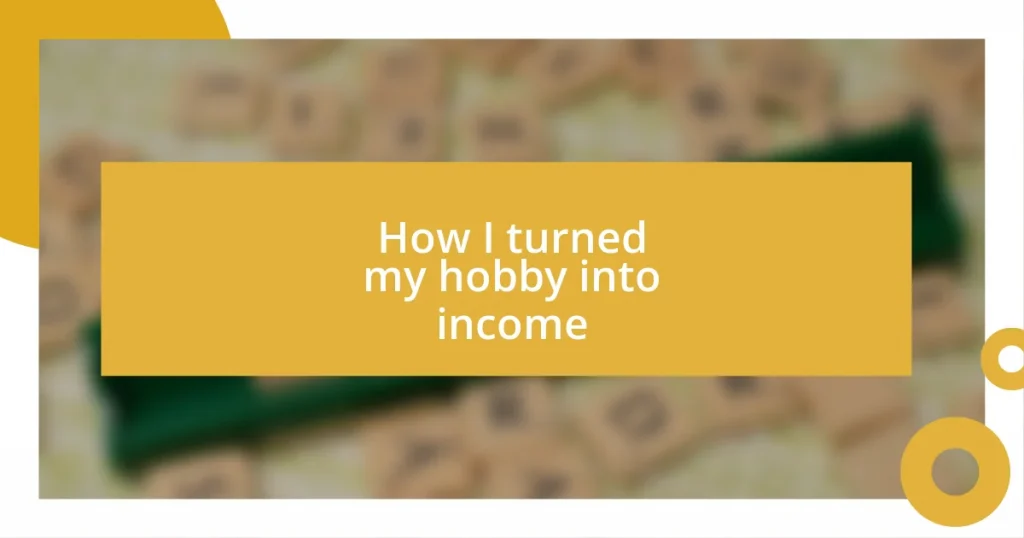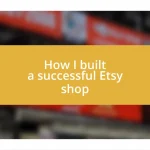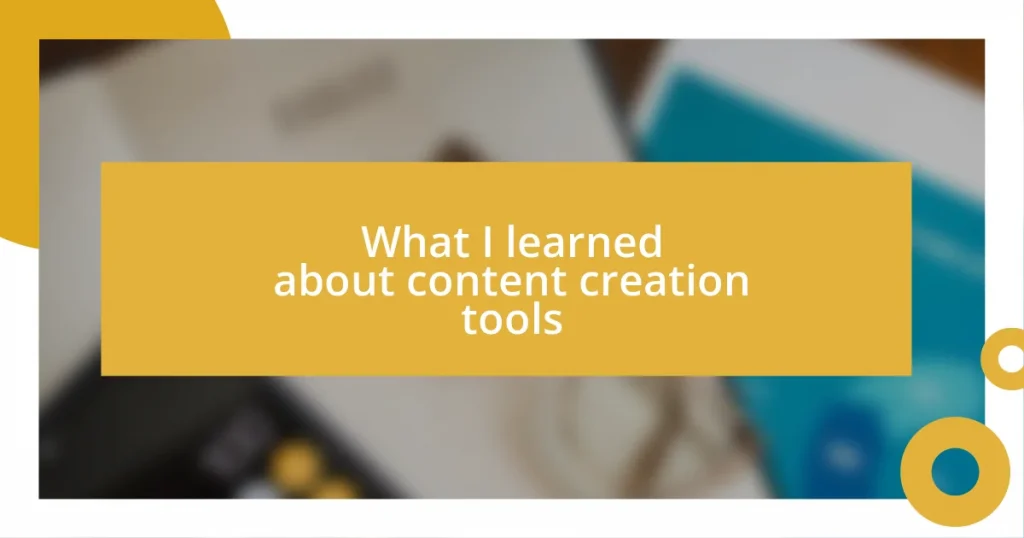Key takeaways:
- Identify your passion and its market potential, considering factors like demand, skill level, and community engagement.
- Build a strong online brand through authentic content creation and community engagement to foster loyalty and connection.
- Set realistic financial goals, diversify income streams, and explore passive income options to sustain and scale your hobby business.
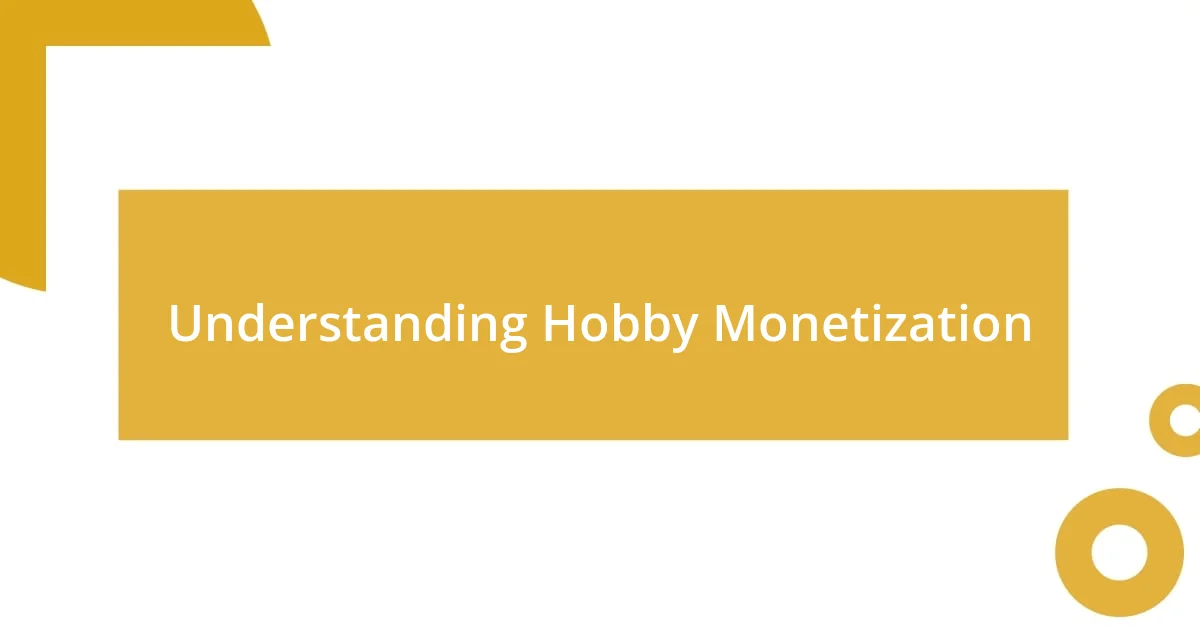
Understanding Hobby Monetization
Monetizing a hobby is all about recognizing the value of your passion. When I started selling handmade crafts, it felt surreal to transform something I loved doing into income. Have you ever considered how your own passion could also become a source of revenue?
Understanding hobby monetization requires a blend of creativity and practicality. I remember the moment I realized my photography skills could lead to side income; it was both exhilarating and nerve-wracking. This journey taught me the importance of identifying a target audience and figuring out how to fulfill their needs while staying true to myself.
As I delved deeper into monetizing my pursuits, I realized that success often hinges on building a community around your hobby. Engaging with like-minded individuals not only fosters creativity but also opens doors for collaboration and opportunities. Isn’t it exciting to think about how sharing your passion can lead to unexpected connections and growth?
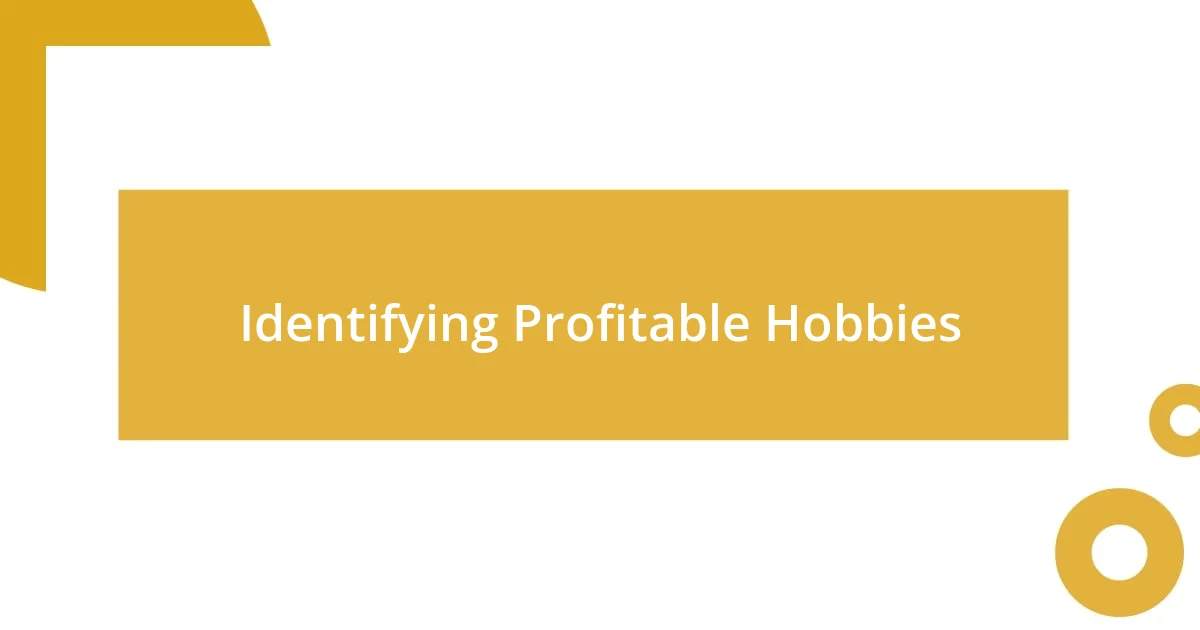
Identifying Profitable Hobbies
Identifying a profitable hobby often starts with a simple reflection on what you genuinely enjoy doing. For me, it was that unforgettable afternoon spent experimenting with different flavors in my kitchen. I realized that what felt like play could actually become my path to income, especially when friends and family couldn’t stop raving about my creations. It’s all about tapping into your passion and assessing its market potential.
To help you pinpoint your own profitable hobbies, consider these factors:
- Market Demand: Look at what people are currently interested in or seeking.
- Personal Skill Level: Assess what you’re good at and whether you want to improve those skills further.
- Unique Selling Proposition: Identify what makes your hobby stand out from others.
- Community Engagement: Explore local groups or online forums to see what others are sharing and discussing.
- Cross-Promotion Opportunities: Think about how your hobby could intersect with other markets or industries.
Reflecting on these points can reveal exciting ways to transform your passion into profits!

Building Your Brand Online
Building your brand online is a crucial step in turning your hobby into a profitable venture. I vividly recall the first time I launched my social media profiles dedicated to my handmade jewelry. It was thrilling to share not only my creations but also snippets of my creative process. I found that authenticity resonated with my audience; they connected with my story, which made them more likely to support my work. Have you thought about what makes your brand unique?
Creating a consistent online presence doesn’t just limit itself to social media; it’s also about generating high-quality content. When I started blogging about my crafting journey, I quickly realized how it positioned me as an authority in my niche. Providing valuable insights and tutorials not only showcased my expertise but also nurtured a community around my passion. It’s amazing how sharing your knowledge can turn followers into loyal customers.
As I navigated this digital world, I learned the importance of visual branding. Using cohesive colors and design elements across all platforms helped me create a recognizable identity. I still remember the first time I saw my logo on merchandise; it filled me with pride! To keep things engaging, I also leverage user-generated content by sharing photos of my customers wearing my pieces. This approach not only provides social proof but also fosters a sense of belonging among my audience. Isn’t it inspiring how you can build meaningful relationships through your brand?
| Branding Element | Importance |
|---|---|
| Visual Identity | Creates recognition and trust. |
| Content Creation | Establishes authority and connection. |
| Community Engagement | Fosters loyalty and encourages sharing. |
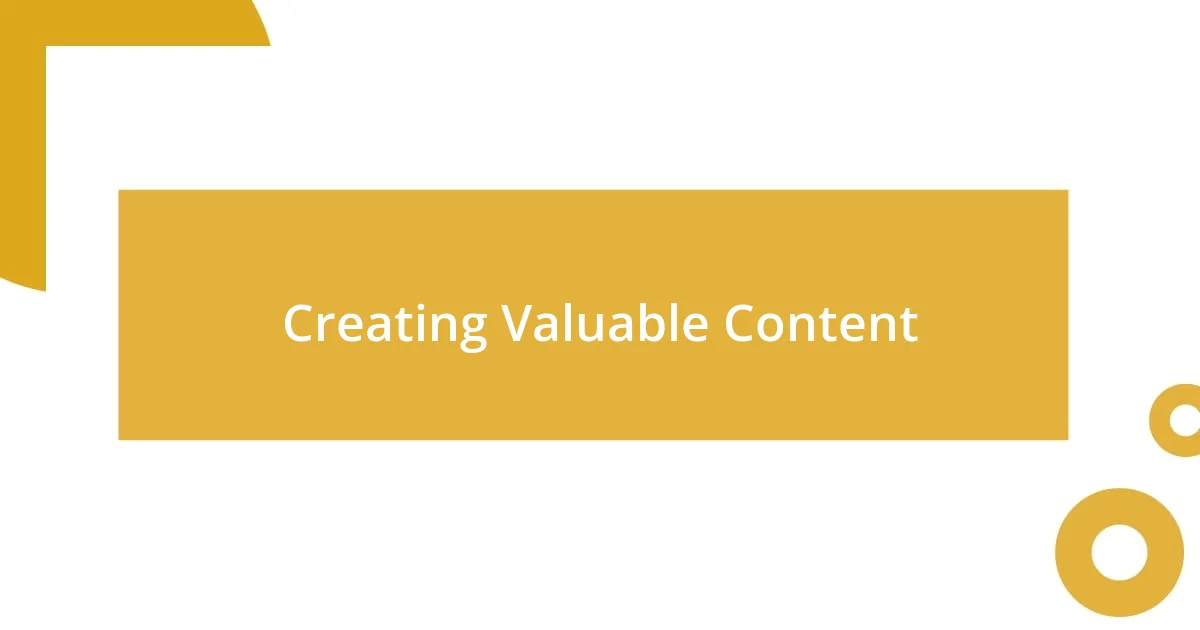
Creating Valuable Content
Creating valuable content is where the real magic happens. I remember the first video tutorial I made on crafting resin jewelry. I was nervous sharing my process, but the response was incredible! People reached out, sharing their own attempts and asking questions. That buzz of community made me realize how crucial it is to offer content that truly resonates with your audience. Have you thought about what kind of content aligns with your passion and what your audience craves?
As I delved deeper into content creation, I discovered that variety is essential. I started mixing blog posts, videos, and even live demos, which allowed me to showcase my personality in different ways. One day, I hosted a live Q&A on social media, answering questions about my techniques while crafting in real-time. The engagement skyrocketed! It showed me that creating valuable content isn’t just about information; it’s also about creating an experience that invites interaction. Isn’t it rewarding when your audience feels involved in your journey?
Another enlightening moment came when I began sharing personal stories tied to each piece I created. For instance, a necklace inspired by my grandmother’s charm collection drew emotional connections from my followers. They began sharing their own stories, transforming my followers into a supportive community. This experience reinforced for me that valuable content goes beyond tutorials; it’s about connection. What stories can you share that might inspire others?

Marketing Your Hobby Business
Finding the right marketing strategies for my hobby business was like discovering hidden treasures. Early on, I focused on leveraging social media platforms, and honestly, it felt like stepping into a whole new world. I remember getting my first comment on a post; it was from someone who loved my work! That moment sparked a fire in me. Have you ever thought about how impactful the right platform can be for connecting with your audience?
Email marketing also turned out to be a game changer for me. I set up a newsletter, and the first few responses I received were incredible. It was thrilling to share exclusive insights and tips, and my followers genuinely appreciated it. I also included personal touches, like sharing behind-the-scenes stories about my creative journey. This showed them I wasn’t just selling a product; I was inviting them into my world. How about you? Have you considered combining storytelling with your marketing efforts?
Collaborative marketing opened unexpected doors, too. I reached out to fellow artisans and proposed joint giveaways, and I can’t express how exhilarating it was to cross-promote our work. The shared excitement drew in diverse audiences, and I was amazed at the new followers I gained just through collaboration. Partnership opportunities can significantly expand your reach, don’t you think?

Setting Realistic Financial Goals
Setting realistic financial goals is crucial for transforming your hobby into a sustainable income source. I recall my early days when I ambitiously set a target to earn as much in my first month as I had in my previous full-time job. Reality check! It was a huge leap that left me feeling overwhelmed and disheartened. Have you ever set a goal that felt more like a dream?
As I recalibrated my approach, I started focusing on smaller, achievable milestones. For instance, my first goal became selling just five pieces a month. Celebrating that initial success was a game changer; it ignited a sense of accomplishment and motivated me to keep pushing forward. I learned that financial goals should be like stepping stones rather than insurmountable mountains. What small steps can you take to achieve your own financial milestones?
I also realized the importance of factoring in fluctuations in income. There were months of hustle where sales soared, and others where I barely squeaked by. Understanding that this was part of the process helped me create a cushion for those lean times. It’s natural to want instant success, but being prepared for the ebb and flow of income makes the journey much more manageable. How do you plan to navigate the ups and downs that come with pursuing your passion?

Scaling Your Income Streams
Scaling your income streams can feel like climbing a mountain—challenging yet incredibly rewarding. I discovered that diversifying my offerings was key to reaching new heights. For example, once I established a bit of a following, I started offering workshops on my craft, which not only created an additional revenue stream but also allowed me to connect with my audience in a meaningful way. Have you considered how sharing your knowledge could amplify your income?
As I continued to grow, I began exploring passive income options, which felt like a lightbulb moment. I started selling digital products, like e-books and printable designs, which provided me with ongoing income with minimal effort after the initial work. It was a revelation that not everything needs to be hands-on. How might passive income strategies transform your approach to monetizing your passion?
I also learned the value of investing back into my hobby business for scaling purposes. Hiring an assistant for social media management freed up my time, allowing me to focus on creating and innovating. This decision initially felt daunting, but seeing the increased engagement and sales made me realize that carefully scaling my efforts was essential for long-term success. What strategies can you implement to ensure your business doesn’t plateau?










